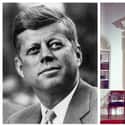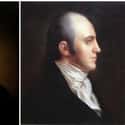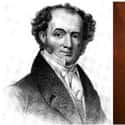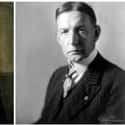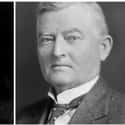-
(#3) John F. Kennedy And Lyndon Johnson's Massive Egos Made For A Difficult Relationship
In 1960, John F. Kennedy was nominated for President after a very contentious primary campaign in which Kennedy's chief competition was Senate Majority Leader Lyndon Johnson. Johnson, a powerful Senator and take-no-prisoners campaigner used Kennedy's Catholic faith and health against him in his bid for the nomination. Because JFK knew the election would be difficult, he acquiesced and put Johnson on the ticket, which probably won him the election. But the Northeastern intellectuals who made up Kennedy's cabinet and administration belittled Johnson and shut him out of any meaningful role in the new government. The President rarely met with Johnson personally, and his brother, Attorney General Robert Kennedy, openly feuded with Johnson in public. Johnson was reduced to globetrotting around the world, an assignment that he felt was a way to humiliate him and get him out of Washington.
His treatment would result in a deep resentment that was expressed forcefully when President Kennedy was assassinated. When Jackie Kennedy and other administration officials returned to Air Force One for the flight back to Washington after Kennedy's assassination, they were confronted with Lyndon Johnson already in the President's cabin, having refused Jackie's request to remain in this prestigious location for one last time. This attitude was the final chapter in a relationship that deeply embittered Lyndon Johnson and permanently estranged him from the Kennedys, but he didn't care. Now, he was the President.
-
(#4) Al Gore Blamed Bill Clinton For His 2000 Defeat
By October of 2000, Al Gore and Bill Clinton were no longer even speaking to each other. Initially quite close during their two successful presidential campaigns, the two men drifted apart as the web of scandal engulfed Bill Clinton's second term. As early as 1999, Gore publicly criticized the President for his conduct concerning his affair with White House intern Monica Lewinsky and privately disliked the authority given to Hillary Clinton, which he felt came at his expense. Clinton began to be irritated by this attitude as well as Gore's deliberate refusal to campaign with him and believed that Gore also wanted to prove that he could get elected on his own.
When Gore lost an excruciatingly close election in 2000, he blamed Clinton's personal conduct for the loss, igniting a tense White House confrontation in December of 2000. They would patch up their relationship after 9/11.
-
(#1) Thomas Jefferson And Aaron Burr's Antagonism Changed The Electoral College
In 1800, only a decade after its development, the American presidential electoral process faced a dilemma that clearly demonstrated that the elections were still a work in progress. After all votes were cast and electors designated, the two Republican Party candidates, Thomas Jefferson and Aaron Burr, were tied with 73 electoral votes. In those days, parties did not designate a combined ticket, so it was possible for electors to cast two votes for any of four candidates. The one with the clear majority would win, and the one who came in second would become vice president. In the 1800 election, the Republican Party decided they wanted Jefferson to win the presidency and Burr to win the vice presidency.
However, things didn't exactly go as planned when the vote went to the House of Representatives. It took 36 ballots, but Jefferson eventually prevailed, chiefly because some of the Federalists in Congress – at the urging of Alexander Hamilton – abstained, throwing the election to Jefferson. For finishing second, Burr became the vice president but was immediately ostracized by Jefferson, who suspected that he had actually attempted to obtain the presidency for himself during the lengthy maneuvering and chicanery that went on during the election. Any of Burr's requests for official appointments in the new cabinet were ignored, and he was quickly isolated. By 1804, it was a foregone conclusion that he would be dropped from the ticket. When his unsuccessful 1804 campaign for Governor of New York was impacted negatively by Alexander Hamilton, Burr's political frustration boiled over into the notorious duel that killed the former Secretary of the Treasury and rendered the Vice President a political pariah.
Angered by his banishment from American politics, Burr left the US and hatched a misguided plot to seize the western territories and place himself at the head of his own country. The plan never got off the ground, and Jefferson's animosity prompted a trial for treason, with the President fully intending to hang his former Vice President. Luckily for Burr, Chief Justice John Marshall, who presided over the trial, set a very high standard of guilt, and Burr was acquitted. Still, the hostility of the political establishment and the President was so great that Burr fled to Europe and did not return for four years.
The election of 1800 caused such turmoil that the 12th Amendment to the Constitution was passed, which would subsequently allow electors to vote for a president and vice president instead of two votes for president.
-
(#11) Richard Johnson Was So Bad, Van Buren Wouldn't Even Pick A VP
Martin Van Buren's Vice President during his first (and only) term, Richard Johnson, might be the worst VP in US history. Johnson was so incompetent and ineffectual, Van Buren refused to select ANY person as his running mate when he unsuccessfully ran for re-election in 1840. Johnson was a war hero who supposedly killed the Native American Chief Tecumseh in the War of 1812. One of Johnson's political liabilities was his common law marriage to a slave in which he fathered two children. By law, he was forbidden to actually marry the woman, and the relationship was a scandal that prevented his election by the Electoral College. Subsequently, he was elected by the Senate. Although Johnson would cast 14 tie-breaking votes, he never explained himself while doing so.
Because of financial difficulties in 1837, he took a nine-month leave of absence to return home to his native Kentucky where he opened and operated a bar and hotel. When it came time to nominate a vice-presidential candidate in 1840, even Andrew Jackson, Johnson's main supporter in 1836, admitted that Johnson had to go. Rather then officially dropping a war hero in an election against William Henry Harrison, the party did not officially designate a candidate, figuring that if Van Buren was re-elected, the Electoral College or even the Senate could elect someone. The voters solved this problem by soundly defeating Van Buren and electing Harrison the ninth President.
-
(#10) Calvin Coolidge Got Angry With Charles Dawes When The VP Slept In
Charles Dawes was not Calvin Coolidge's first choice for VP when Coolidge ran for re-election in 1924. The position was actually offered to another politician who turned it down. Dawes's public tirades and stubbornly opinionated attitude were at odds with the President known as "Silent Cal." When Dawes slept through a cabinet vote in the Senate that barely rejected a Coolidge nominee, he became a public laughingstock.
Greatly upset, Coolidge, who declined to run in 1928, made it clear that he would consider the nomination of Dawes in 1928 a personal insult. The party nominated Herbert Hoover instead.
-
(#5) Franklin D. Roosevelt May Have Run For A Third Term To Prevent His VP From Being Elected President
FDR initially got along well with his plainspoken Vice President, John Nance Garner. Garner, a hard-drinking, no-nonsense Texan, once claimed that the Vice Presidency wasn't "worth a pitcher of warm piss." Nicknamed "Cactus Jack" for his acerbic manner, Garner eventually soured on FDR's liberal, New Deal program, which clashed with his conservative perspective. Even worse, with the 1940 election approaching and Garner in his 70s, the former House Speaker figured that it was now or never if he ever wanted to be President. Garner also further alienated Roosevelt with isolationist foreign policy views and the belief that federal troops should have been used to put down labor strikes in the late '30s, an alternative at odds with the labor base of the Democratic Party.
When Garner openly challenged Roosevelt, he was outmaneuvered when the President allowed himself to be "drafted" as a candidate, a strategy that enabled him to avoid scrutiny for breaking the unwritten "two term" rule that was presidential tradition. Garner essentially retired from politics and went back to Texas, thinking that he wasn't going to live much longer, anyway. Surprisingly, he lasted another 27 years and died in 1967, aged 98 years, 350 days.
New Random Displays Display All By Ranking
About This Tool
The U.S. Constitution itself stipulates that the president’s succession is very simple. When talking about political positions in the United States, people will naturally think of core officials such as the President and Secretary of State of the United States, but people rarely notice who the Vice President of the United States is. Is the vice president really an irrelevant position? In fact, the vice president is second only to the president. When the president is removed from office, or dies or resigns, these powers and responsibilities will be transferred to the vice president.
The particularity of the vice president is that he must concurrently serve as the speaker of the U.S. Senate and the actual leader of the Senate, which has also led to conflicts between the duties of multiple presidents and vice presidents. The random tool lists 11 American presidents and vice presidents who did not get along well.
Our data comes from Ranker, If you want to participate in the ranking of items displayed on this page, please click here.











